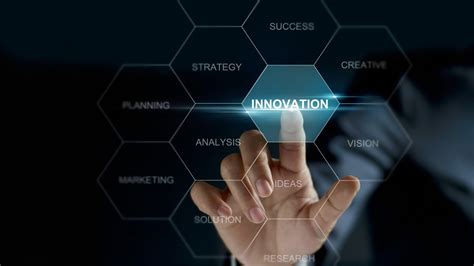As we continue to hurtle forward into the 21st century, technology is increasingly playing a pivotal role in shaping the world around us. From the way we communicate and access information to the way we live and work, tech is driving innovation and transforming the fabric of our society. Here, we'll explore five ways global tech is leading the future and revolutionizing the world as we know it.
The Rise of Artificial Intelligence
Artificial intelligence (AI) is one of the most significant technological advancements of our time. From virtual assistants like Siri and Alexa to self-driving cars and personalized product recommendations, AI is increasingly becoming an integral part of our daily lives. AI is enabling businesses to automate processes, streamline operations, and make data-driven decisions, leading to increased efficiency and productivity.

One of the most significant applications of AI is in the field of healthcare. AI-powered algorithms are being used to analyze medical images, diagnose diseases, and develop personalized treatment plans. For instance, Google's AI-powered LYNA (Lymph Node Assistant) can detect breast cancer from lymph node biopsies with a high degree of accuracy, outperforming human pathologists.
The Internet of Things (IoT) Revolution
The Internet of Things (IoT) refers to the network of physical devices, vehicles, home appliances, and other items embedded with sensors, software, and connectivity, allowing them to collect and exchange data. The IoT is transforming the way we live and work, enabling us to control and monitor our surroundings with unprecedented precision.

One of the most significant applications of IoT is in the field of smart cities. IoT sensors and devices are being used to monitor and manage urban infrastructure, traffic flow, and waste management, making cities more efficient, sustainable, and livable. For instance, the city of Barcelona has implemented an IoT-powered smart waste management system, which has reduced waste collection costs by 25% and increased recycling rates by 20%.
The Rise of Blockchain Technology
Blockchain technology is a decentralized, digital ledger that records transactions across a network of computers. It's the underlying technology behind cryptocurrencies like Bitcoin and Ethereum, but its applications extend far beyond digital currency.

One of the most significant applications of blockchain technology is in the field of supply chain management. Blockchain-based systems can track and verify the movement of goods, enabling companies to identify counterfeit products, reduce inventory costs, and improve logistics. For instance, Maersk, the world's largest container shipping company, has implemented a blockchain-based system to track and verify the movement of containers, reducing transit times by 40% and costs by 20%.
The Future of Renewable Energy
Renewable energy sources like solar, wind, and hydroelectric power are becoming increasingly cost-competitive with fossil fuels, driving a global shift towards cleaner, more sustainable energy. The cost of solar energy, for instance, has fallen by over 70% in the last decade, making it more affordable for businesses and households to adopt.

One of the most significant applications of renewable energy is in the field of transportation. Electric vehicles (EVs) are becoming increasingly popular, with many countries investing heavily in EV infrastructure. For instance, Norway has implemented a comprehensive EV policy, which includes incentives, tax exemptions, and investment in charging infrastructure, making it one of the leading EV markets in the world.
The Rise of Virtual and Augmented Reality
Virtual and augmented reality (VR/AR) technologies are revolutionizing the way we interact with information, each other, and our surroundings. From immersive gaming experiences to interactive product demos, VR/AR is transforming the way we live, work, and play.

One of the most significant applications of VR/AR is in the field of education. VR/AR can create immersive, interactive learning experiences that make complex concepts more engaging and accessible. For instance, Google's Expeditions program uses VR to take students on virtual field trips to over 100 destinations, including historical landmarks, museums, and other places of cultural significance.
Gallery of Global Tech Innovations






What is the impact of global tech on the environment?
+Global tech has a significant impact on the environment, both positive and negative. While tech can enable sustainable practices and reduce carbon emissions, it also contributes to e-waste, energy consumption, and pollution. However, many tech companies are now prioritizing sustainability and environmental responsibility, investing in renewable energy, reducing waste, and promoting eco-friendly practices.
How is global tech transforming the workforce?
+Global tech is transforming the workforce in many ways, including the rise of remote work, automation, and AI-powered tools. While these changes bring many benefits, such as increased flexibility and productivity, they also pose challenges, such as job displacement and skills obsolescence. To thrive in this new landscape, workers need to develop skills that complement technology, such as creativity, problem-solving, and critical thinking.
What are the most significant global tech trends in 2023?
+Some of the most significant global tech trends in 2023 include the rise of AI, IoT, blockchain, renewable energy, and virtual and augmented reality. These technologies are transforming industries, revolutionizing the way we live and work, and creating new opportunities for innovation and growth.
As we continue to navigate the complexities of the 21st century, it's clear that global tech will play an increasingly important role in shaping our world. From AI and IoT to renewable energy and virtual reality, these technologies are transforming industries, revolutionizing the way we live and work, and creating new opportunities for innovation and growth. As we move forward, it's essential to prioritize sustainability, responsibility, and inclusivity, ensuring that the benefits of global tech are shared by all.
